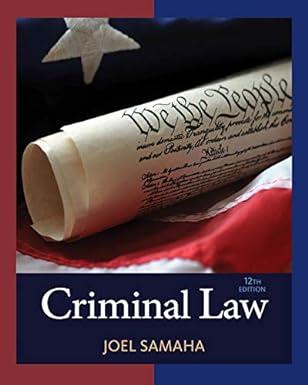Dwight Ralph Smallwood was convicted of assault with intent to murder, reckless endangerment, and attempted murder. The
Question:
Dwight Ralph Smallwood was convicted of assault with intent to murder, reckless endangerment, and attempted murder. The trial court sentenced Smallwood to concurrent sentences of life imprisonment for attempted rape, 20 years’ imprisonment for robbery with a deadly weapon, 30 years’ imprisonment for assault with intent to murder, and five years’ imprisonment for reckless endangerment. The court also imposed a concurrent 30-year sentence for each of the three counts of attempted second-degree murder. The conviction was based on evidence that Smallwood knew he had human immunodeficiency virus (HIV) when he raped three women.
The Court of Appeals
Smallwood appealed to Maryland’s highest court, the Court of Appeals. The court held that the evidence that Smallwood knew he had human immunodeficiency virus (HIV) when he raped three women was insufficient to prove that he had the intent to kill. According to the court, we have no trouble concluding that Smallwood intentionally exposed his victims to the risk of HIV infection. The problem before us, however, is whether knowingly exposing someone to a risk of HIV-infection is by itself sufficient to infer that Smallwood possessed an intent to kill.
The State in this case would allow the trier of fact to infer an intent to kill based solely upon the fact that Smallwood exposed his victims to the risk that they might contract HIV. Without evidence showing that such a result is sufficiently probable to support this inference, we conclude that Smallwood’s convictions for attempted murder and assault with intent to murder must be reversed.
1. Go to http://mdcourts.gov/opinions/cosa/1995/1678s94.
pdf (March 1, 2015) and read the full opinion of the Court of Special Appeals of Maryland (Maryland’s intermediate appeals court).
2. Then, go to http://www.mdcourts.gov/opinions/coa /1996/122a95.pdf (March 1, 2015), and read the Court of Appeals (Maryland’s Supreme Court) full opinion in the case.
3. Did Smallwood intend to kill his victims or to spread the virus?
4. Does your answer depend at all on your position as to which interpretation of the law supports the most ethical public policy?
Step by Step Answer:






